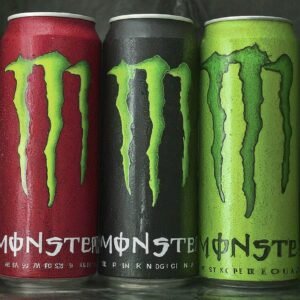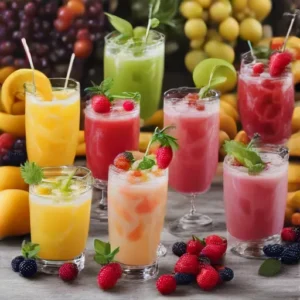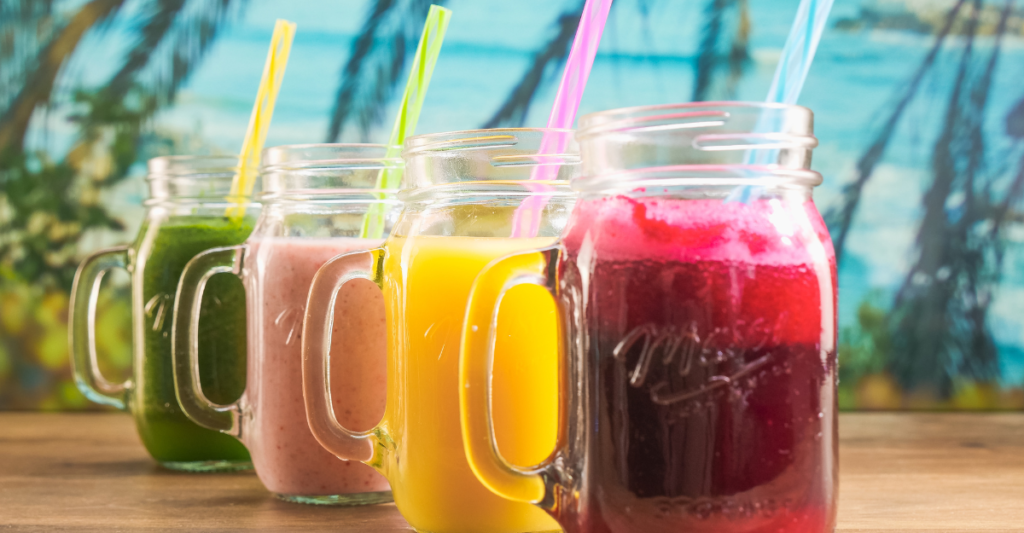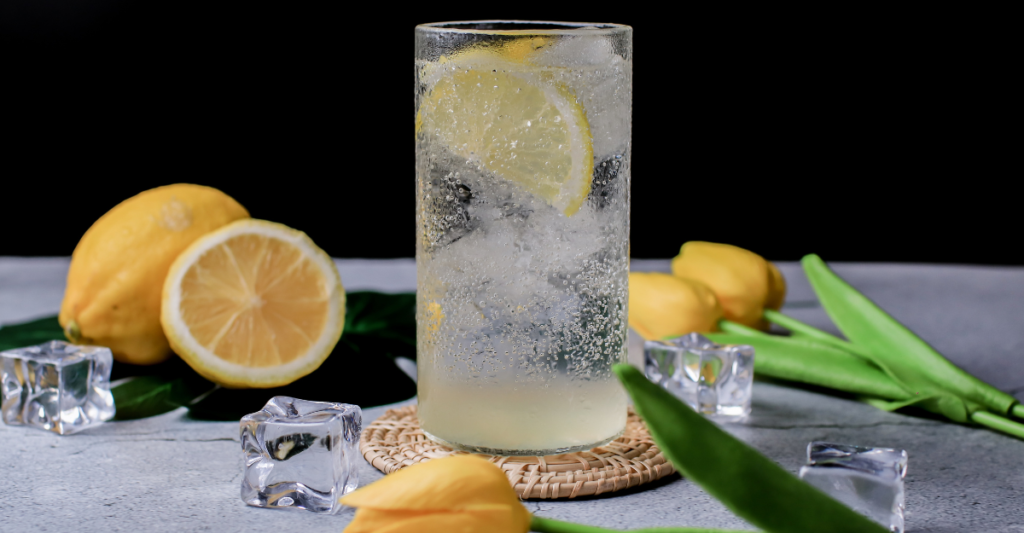Energy drinks have become a staple for many seeking a quick boost of energy, especially during long work hours or intense study sessions. However, behind that jolt of energy lies a concoction of ingredients that could be more harmful than you realize.
Let’s dive into some of the most unhealthy energy drinks on the market, focusing on their high sugar content, excessive caffeine levels, and artificial additives.
What is the most Unhealthy Energy Drinks

Here are the top 22 worst energy drinks that will harm you if you drink them. Also explore the Best Energy Drink to Keep You Awake and Focused.
1. Red Bull
Red Bull contains 27 grams of sugar per 8.4-ounce can and 80 milligrams of caffeine. This high sugar content can lead to spikes in blood sugar levels and contribute to weight gain, while the caffeine can cause jitteriness, increased heart rate, and sleep disturbances if consumed in excess.
2. Monster Energy
Monster Energy packs 54 grams of sugar and 160 milligrams of caffeine per 16-ounce can. The excessive sugar content increases the risk of diabetes and obesity, while the high caffeine content can lead to heart palpitations, anxiety, and potential caffeine dependence.
3. Rockstar Energy Drink
Rockstar contains 63 grams of sugar and 160 milligrams of caffeine per 16-ounce can. Such high levels of sugar and caffeine can cause significant health issues, including increased risk of metabolic syndrome, cardiovascular problems, and a higher likelihood of developing type 2 diabetes.
4. 5-hour Energy
5-hour Energy shots contain around 200 milligrams of caffeine per 2-ounce shot. Although it has zero sugar, the high caffeine content can lead to increased blood pressure, heart palpitations, and potential caffeine toxicity, especially if multiple shots are consumed in a short period.
5. NOS Energy Drink
NOS contains 54 grams of sugar and 160 milligrams of caffeine per 16-ounce can. The high sugar and caffeine content can lead to rapid spikes in blood sugar, increased risk of obesity, and cardiovascular issues, making it a less healthy choice for regular consumption.
6. Full Throttle Energy Drink
Full Throttle has 55 grams of sugar and 160 milligrams of caffeine per 16-ounce can. This combination of high sugar and caffeine can result in weight gain, increased risk of type 2 diabetes, and potential heart-related problems, particularly with excessive intake.
7. Amp Energy
Amp Energy contains 58 grams of sugar and 142 milligrams of caffeine per 16-ounce can. The high sugar content can contribute to insulin resistance and obesity, while the caffeine can cause nervousness, insomnia, and an increased heart rate.
8. Bang Energy
Bang Energy drinks contain 300 milligrams of caffeine per 16-ounce can with zero sugar. While the lack of sugar is a plus, the extremely high caffeine content can cause severe jitters, anxiety, and heart palpitations, particularly in individuals sensitive to caffeine.
9. Reign Total Body Fuel
Reign Total Body Fuel has 300 milligrams of caffeine per 16-ounce can and no sugar. Despite the lack of sugar, the high caffeine content poses risks such as increased blood pressure, heart palpitations, and potential caffeine toxicity, especially if consumed excessively.
Also explore the Energy drinks with low Caffeine
10. Celsius Energy Drink
Celsius contains 200 milligrams of caffeine per 12-ounce can and no sugar. While sugar-free, the high caffeine level can still cause adverse effects like nervousness, sleep disruption, and heart palpitations, making it a drink to consume with caution.
11. Xyience Energy Drink
Xyience contains 176 milligrams of caffeine per 16-ounce can and is sugar-free. Despite being free of sugar, the high caffeine content can lead to negative side effects such as anxiety, increased heart rate, and insomnia, particularly when consumed in large amounts.
12. VPX Redline Xtreme
VPX Redline Xtreme packs 316 milligrams of caffeine per 8-ounce bottle with no sugar. The extremely high caffeine content can cause severe side effects including heart palpitations, nervousness, and potential caffeine overdose, posing significant health risks.
13. Mountain Dew Kickstart
Mountain Dew Kickstart contains 20 grams of sugar and 92 milligrams of caffeine per 16-ounce can. While lower in caffeine, the added sugar can still contribute to weight gain, increased blood sugar levels, and a higher risk of developing metabolic syndrome.
14. Adrenaline Shoc
Adrenaline Shoc has 300 milligrams of caffeine per 16-ounce can with no sugar. Despite being sugar-free, the high caffeine content can cause severe jitters, anxiety, and heart-related issues, especially for individuals with a low tolerance for caffeine.
15. G Fuel
G Fuel contains 140 milligrams of caffeine per 16-ounce can with no sugar. While the absence of sugar is beneficial, the caffeine level can still lead to side effects such as nervousness, increased heart rate, and potential sleep disturbances if consumed in large quantities.
16. Ghost Energy
Ghost Energy has 200 milligrams of caffeine per 16-ounce can with no sugar. Although it’s sugar-free, the significant caffeine content can lead to adverse effects such as anxiety, heart palpitations, and disrupted sleep, particularly if consumed excessively. Also explore the energy drinks without Carbonation.
17. Zevia Zero Calorie Energy
Zevia Zero Calorie Energy contains 120 milligrams of caffeine per 12-ounce can and no sugar. While it avoids sugar, the caffeine level can still cause issues like nervousness, increased heart rate, and potential insomnia, especially in caffeine-sensitive individuals.
Also explore the side effects of drinking energy drinks.
18. Guayaki Yerba Mate
Guayaki Yerba Mate contains 150 milligrams of caffeine per 16-ounce can with 28 grams of sugar. The combination of sugar and caffeine can lead to health problems such as weight gain, increased blood sugar levels, and potential cardiovascular issues.
19. Raze Energy
Raze Energy contains 300 milligrams of caffeine per 16-ounce can with no sugar. Despite being sugar-free, the high caffeine content can cause severe jitters, anxiety, and heart-related issues, particularly for those with low caffeine tolerance.
20. Alani Nu Energy
Alani Nu Energy contains 200 milligrams of caffeine per 12-ounce can with no sugar. While sugar-free, the caffeine content can still cause negative side effects like nervousness, heart palpitations, and potential sleep disruption if consumed in excess.
21. Monster Rehab
Monster Rehab contains 160 milligrams of caffeine per 16-ounce can with 6 grams of sugar. Although lower in sugar, the caffeine level can still lead to adverse effects such as increased heart rate, anxiety, and sleep disturbances.
22. Monster Ultra
Monster Ultra contains 140 milligrams of caffeine per 16-ounce can with no sugar. Despite being sugar-free, the caffeine content can cause issues like nervousness, increased heart rate, and potential insomnia, especially when consumed in large amounts.
10 Best Alternatives to Energy Drinks

Finding healthier alternatives to energy drinks can be a game-changer for maintaining energy levels without the adverse health effects. Here are the ten best alternatives of energy drinks. Also explore the health substitute of energy drinks
1. Green Tea
Green tea offers a natural energy boost with about 30-50 mg of caffeine per cup, less than coffee but enough to enhance alertness. It also contains L-theanine, which promotes relaxation without drowsiness. Rich in antioxidants, it supports overall health and can be a refreshing, low-calorie alternative to energy drinks.
2. Yerba Mate
Yerba mate is a South American beverage containing 85 mg of caffeine per cup. It provides a balanced energy lift without the jitteriness. Packed with vitamins, minerals, and antioxidants, yerba mate promotes focus and supports the immune system. It’s a robust, flavorful substitute for traditional energy drinks.
3. Coconut Water
Coconut water is a natural electrolyte drink, hydrating and replenishing lost minerals. It’s low in calories, with about 45 calories per cup, and contains potassium, magnesium, and sodium, essential for energy production and muscle function. It’s an excellent, refreshing option to keep you energized and hydrated.
4. Smoothies
Smoothies made with fruits, vegetables, and a protein source like Greek yogurt or protein powder provide sustained energy. They are rich in vitamins, minerals, and fiber, supporting digestive health and stabilizing blood sugar levels. A well-balanced smoothie can be a nutritious, customizable energy drink alternative.
5. Water
Staying hydrated is crucial for maintaining energy levels. Dehydration can lead to fatigue and decreased cognitive function. Drinking water throughout the day ensures optimal physical and mental performance. Adding a slice of lemon or cucumber can make it more appealing and provide a mild energy boost.
6. Herbal Teas
Herbal teas like peppermint or ginger tea are caffeine-free but can invigorate and refresh. Peppermint tea can enhance alertness, while ginger tea supports digestion and reduces inflammation. These teas are comforting, hydrating, and offer various health benefits without the adverse effects of caffeine.
7. Matcha
Matcha, a powdered green tea, contains about 70 mg of caffeine per serving and offers a slow-release energy boost. It’s rich in antioxidants, particularly EGCG, which has numerous health benefits. Matcha’s combination of caffeine and L-theanine improves focus and relaxation, making it an excellent energy drink alternative.
8. Chia Seed Drink
Chia seeds soaked in water create a hydrating and energy-boosting drink. Rich in omega-3 fatty acids, fiber, and protein, chia seeds provide sustained energy and support heart health. Mixing them with water, lemon juice, and a bit of honey makes a nutritious, refreshing drink.
9. Beet Juice
Beet juice is high in nitrates, which improve blood flow and oxygen delivery to muscles. It can enhance physical performance and reduce fatigue. Drinking beet juice before a workout can boost endurance and energy levels naturally. It’s a nutrient-dense, vibrant alternative to commercial energy drinks.
10. Apple Cider Vinegar Drink
Diluting one to two tablespoons of apple cider vinegar in a glass of water with a teaspoon of honey can create an energizing drink. Apple cider vinegar helps regulate blood sugar levels, supports digestion, and provides a mild energy boost. It’s a simple, healthful alternative to traditional energy drinks.
Conclusion:
So here we provide the list of 22 most unhealthy energy drinks with their side effects. After that we also provide their best alternatives that give you benefits.

